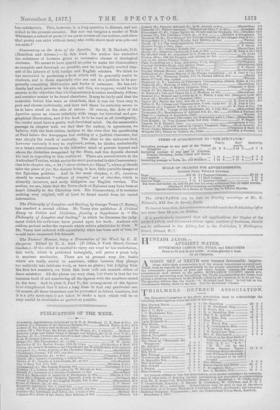Commentary on the Acts of the Apostles. By IL B.
Hackett, D.D. (Hamilton and Adams.) — In this work the author has embodied the substance of lectures given to successive classes of thoological students. Ho seems to have spared no pains to make his Commentary as complete and thorough as possible, and he has largely availed him- self of the labours of both foreign and English scholars. We think be has succeeded in producing a book which will be generally useful to students, and to those especially who are not in a position to be per- petually consulting dictionaries and books of reference. He has evi- dently had such persons in his eye, and this, we suppose, would be his answer to the objection that his Commentary is rather needlessly diffuse, and contains matter to be found elsewhere. It may he fairly said that the materials before him were so abundant, that it was far from easy to pick and choose judiciously, and here and there he certainly seems to us to have erred on the side of excess. Of course, the Acts of the Apostles opons an almost infinitely wide range for historical and geo- graphical illustration, and if tho book is to be road at all intelligently, the reader must have a pretty well-furnished mind. On the memorable passage in chapter xvii, we find that the author, in agreement, we honey°, with tho beet orities, inelinoe to the view that the questioning .of Paul before the Areopagus had nothing of a judicial character, but was simply the result of curiosity. The altar to the unknown God, 'however variously it may be explained, points, ho thinks, undoubtedly to a latent consciousness in the Athenian mind of powers boyond and above the divinities recognised by the State, and the Apostle showed his tact in appealing to this sontimont. There are several errors in the Authorised Version, which are fertile most part noted in this Commentary. One is in chapter xix., v.24 (" silver shrines for Diana "), whore of should take the place offer, the shrines being, in fact, little portable images of the Ephesian goddess. And in the same chapter, v. 87, ;spur:ado; 'should be rendered "robbers of temples," not of churches, which is absurdly incorrect, and sadly disfigures our English version. The author, we see, hints that tho Town-clerk of Ephesus may have boon at heart friendly to the Christian sect. His Commentary, if it contains nothing very original, will at least bo found useful from its varied information.


































 Previous page
Previous page